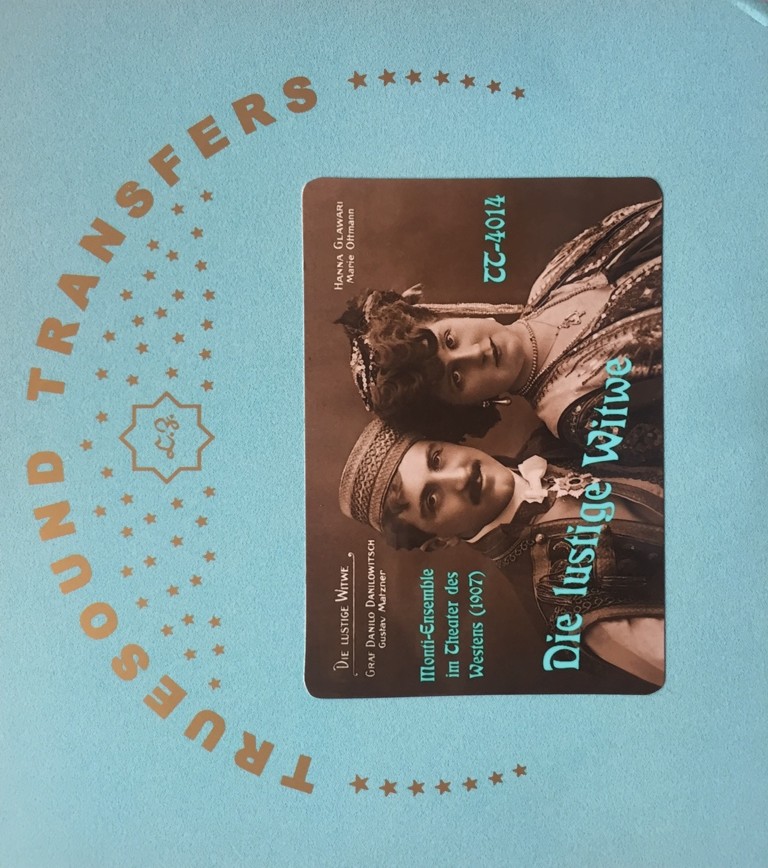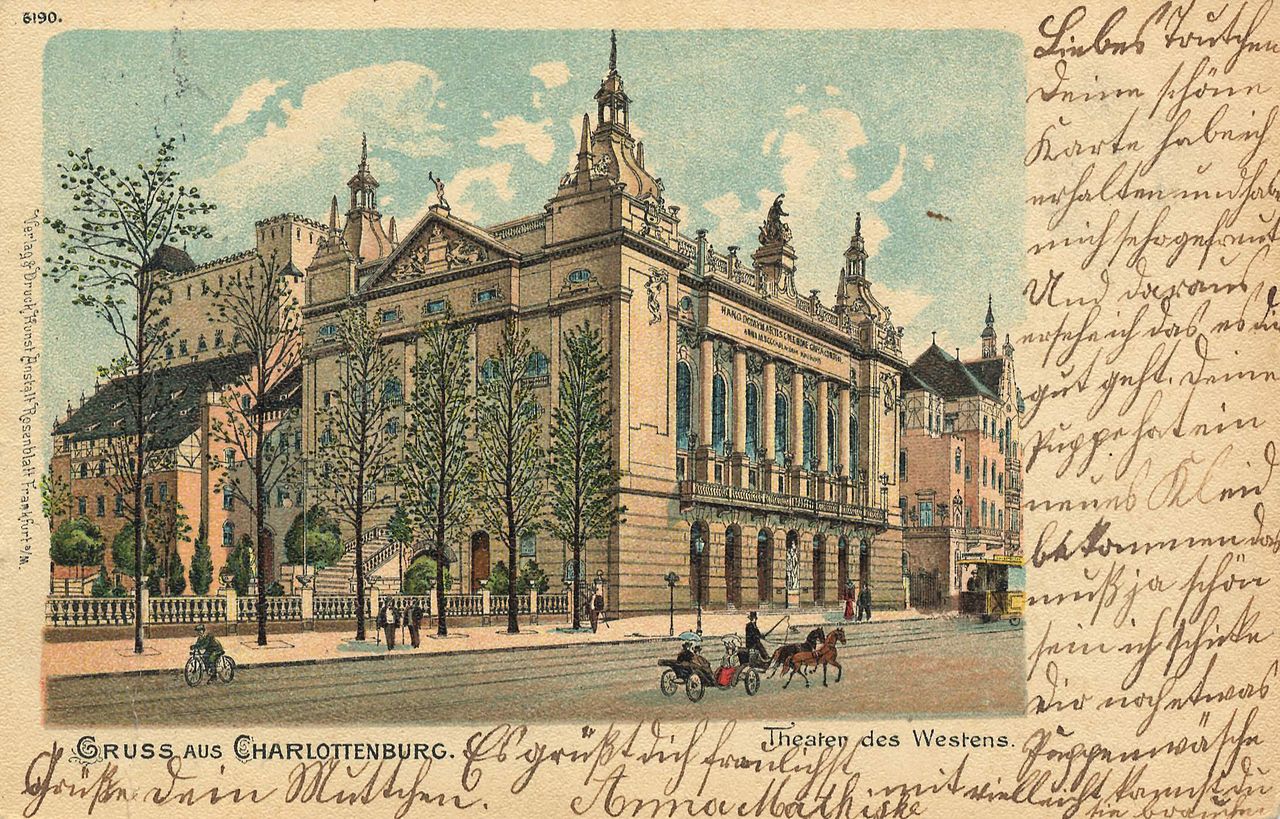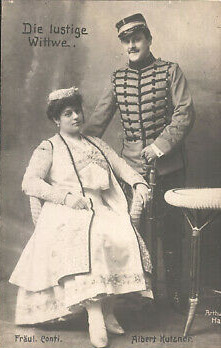Kevin Clarke
Operetta Research Center
9 June, 2020
It wouldn’t be an exaggeration to say that this first ever CD release of Die lustige Witwe with the 1906/7 original German cast – as opposed to the Vienna cast – is a sensation. Not least because you get to hear the complete show on 32 tracks, performed by the stars of Max Monti’s operetta ensemble in Berlin, with Gustav Matzner as a superbly comic Danilo and Marie Ottmann as a sensuous and witty “Witwe.”

Gustav Matzner as Danilo and Marie Ottmann as Hanna in the original Berlin production, 1907. (Photo: Christian Zwarg Archive)
Obviously, these 32 individual recordings are from the stone age of cast albums. But you get star conductor Bruno Seidler-Winkler, a sizable orchestra, full supporting cast, and thanks to master restorer Christian Zwarg at Truesound Transfers you get an unbelievably cleaned-up sound. If you didn’t know better you’d never (!) guess that these recordings were made in May 1907 in 36 Ritterstraße, in the studios of Deutsche Grammophon AG. They beam you straight into the past and make you gasp. Because this is a version of the Merry Widow you will not have heard before.
The most noticeable difference is the famous waltz “Lippen schweigen.” It’s not placed at the end of act three as in all other recordings; instead Hanna and Danilo sing it as a “Tanzduett” in a Spielszene in act 2, after “Dummer Reitersmann.” At the end of “Lippen schweigen” Hanna gets so annoyed that Danilo doesn’t speak to her about his feelings that she storms off into that pavilion – and threatens to marry Camille de Rossillon. In act 3, where we’re used to hearing “Lippen schweigen” Hanna and Danilo sing the duet “Zauber der stillen Häuslichkeit” outlining the joys of simple domesticity they could have enjoyed if (!) he hadn’t dumped her, leaving her to marry the rich court banker who died eight days after the wedding. In her desperation she announces that she will lose all her money if she marries again, to which Danilo suddenly declares his love – and gets her, plus her 20 millions. What a happy end! (Feminists would be up in arms about this today.)

The cover of the Truesound Transfers “Lustige Witwe” album.
Back in 1997 musicologist Harald Haslmayr wrote in Musik in Geschichte und Gesellschaft (MGG) that the recording made by John Eliot Gardiner in 1995 was the first to give the piece its “esthetically very convincing original form back.” Not only is this total nonsense (I’m even tempted to say bullshit) in light of a very different kind of casting heard on this album, but also in light of the version played in 1907. Not to mention Vienna, where Louis Treumann and Mizzi Günther also recorded “Zauber der stillen Häuslichkeit” in 1906, they too recorded “Lippen schweigen” as a comedy scene, not as the sentimental tear jerker it later became.
If Treumann was a highly neurotic and eccentric Count Danilo, praised for his nervousness and hysteria, sexual allure and grotesque dancing, then Berlin’s Gustav Matzner delivers an exact copy, with the same outragious “Balcan accent” but minus the extreme hysteria. That’s most noticeable if you compare Treumann’s “Es waren zwei Königskinder” which is almost boiling over with suppressed emotions with Matzner’s more straightforward rendition. There’s a noticeable difference in star quality, too. But then again: with Mr. Matzner you get the entire score, Treumann only recorded bits. These bits are included on this Truesound Transfers double disc as a bonus. And hearing Treumann/Günther in full restored glory really is fabulous.
If you thought Gardiner’s Bo Skovhus and Cheryl Studer were the “real thing” (or what Lehár originally wanted “esthetically”) think again after you’ve heard the two leading teams here.
Another remarkable aspect of the Berlin cast album is this: almost half of the tracks are dialogue! Obviously back in 1907 record companies considered the dialogue an integral part of an operetta, and it is performed by Monti’s ensemble with highly differentiated character actors who create a Marx Brothers kind of atmosphere. Much of it is pure nonsense, many (like Emilie Symalla as the wife of eternally jealous Kromow) are hysterically funny – think Lesley Ann Warren as Norma Cassady in Victor/Victoria and you’ll get the idea. One of the more interesting jokes is a reference to Camille by someone from the embassy crowd as “Mr. Rosenbaum … oops, Mr. Rossillon.” It puts a different light on that role which is worth exploring further.
Also interesting is the fact that Valencienne, as sung by Louise Obermaier in Berlin 1907, sounds rather older and more mature than Hanna, instead of the other way round. It gives a different balance to the story.
Along the way you hear many small details that would be worth for any modern-day Hanna or Danilo to study: notes held a little longer, a certain gliding up or down before going into the refrain, audible gasps etc.

Berlin’s Theater des Westens in 1900.
Otto Schneidereit writes about Monti and his first German Lustige Witwe in Berlin, wie es weint und lacht that it was a smash hit at Theater des Westens, then a new glittering operetta stage in the chic Western part of the city. At the time, Metropoltheater was playing revues with Fritzi Massary (and music by Victor Hollaender). And Monti’s only competition was Victor Palfi who tried to outshine the Merry Widow with Offenbach’s Barbe-Bleue at the Neues Operettentheater.
In the end, Mr. Monti was the winner in this operetta race, taking over the Theater am Schiffbauerdamm (where later Dreigroschenoper premiered) as well. In 1916 he retired, an extremely rich man who then lost everything during the inflation and died poor in Vienna in 1929.
A year before his death, in 1928, Die lustige Witwe returned to Berlin with Fritzi Massary as an Argentinean millionaires called Hannah Galvarios. Massary’s Witwe recordings (as restored by Mr. Zwarg) are well-known.
Here, on this album, Mr. Zwarg has released for the first time on CD Walter Jankuhn’s Danilo (“Da geh’ ich ins Maxim”) and Max Hansen’s Rossillon (“Komm in den kleinen Pavillion”). Both are remarkable interpretations, because Hansen turns the famous seduction number into a parody of a famous tenor solo. And Jankuhn is on the way to Maurice Chevalier’s Hollywood Danilo, with a little jazzed-up dance evolution at the end of the entry song.

Max Hansen as he looked in his operetta prime in the 1920s and early 30s.
The biggest surprise for me, however, was hearing a Valencienne solo from this 1928 Charell production. As you’ll recall, Massary snatched up all the hit numbers, i.e. most of Valencienne’s solos and duets (recorded by Massary with adapted new lyrics). So what did Valencienne get to sing? Now we know. She has a number called “Halt’ still!” (“Hold still”) which sounds like straight out of a Jerome Kern score, with banjos and syncopations à la “Who” from Sunny (1925). The way Uschi Elleot sings it she proves that this 1928 Witwe was more than just Massary, Massary, Massary.
In short, this is a double album anyone interested in Lehár and Witwe will want to have. And I am surprised it took till 2020 for the full set of Berlin recordings to come out. Did no one bother to look before, did no one think it interesting and worth publishing, not even on YouTube?

Albert Kutzner as Camille de Rossillon in “Die lustige Witwe.”
By the way, Mr. Matzner made a movie-short in 1908 of Die lustige Witwe, it seems to have disappeared without a trace. Additionally, Albert Kutzner (Camille) and Louise Obermaier filmed a duet for which a record was made, so there would be “original” sound to the movie-short. This duet is included on the Truesound Transfers album, as are two tracks in which Louis Treumann sings “Der lustige Witwenfeind” in 1906, a kind of parody of himself caught in the role of Danilo forever… it’s priceless!
Hearing this new album I very much wondered where the original London and New York cast albums are. Surely, if Berlin was able to record a hit show like this in 1907, then groundbreaking West End and Broadway productions (both 1907) must have been recorded too, in some way or other. Any suggestions? (To read Kurt Gänzl’s article on Die lustige Witwe in England and the USA click here.)

Robert Evett recorded five 78 rpm sides with Elizabeth Firth for Columbia in October 1907: A Dutiful Wife and Love in My Heart Awakening each took 2 sides, plus Home which Evett sang as a solo. Both were in the original London cast. Surprisingly Neither Lily Elsie nor Joseph Coyne appeared to have recorded anything from the operetta.
This is truly a spectacular recording – I’ve been waiting decades to hear the 1907 set, and it exceeds my expectations in every respect. Less than 100 bars (much less) are cut from the score, and to call it “lively” doesn’t do it justice. Hearing pre-Great War theatrical German dialogue spoken (with more than an occasional touch of the clipped Berlin accent) is fascinating; it’s very fast, very clear, and very characterfully acted, and the singing is splendid. (Consider – here, the cast has no audience to bounce off, and they’re giving their all into two or maybe three gaping recording horns in a cramped, largely unventilated room with the orchestra piled on risers behind and around them. It wasn’t an environment naturally conducive to jollity, yet this is as joyful, well-played, and EXTREMELY well-sung LUSTIGE WITWE as I’ve ever heard, Matzner and Ottmann both sing superbly, as do Obermaier and the unjustly obscure Fred Carlo as Camille. Seidler-Winkler’s tempos verge on the headlong (which I love) but he also contributes considerable nuance. Pieces like the “Dummer, dummer Reitersmann”, the “Vilja -Lied”, and “Kimm ins’ kleiner Pavillon” are as good or better than anything on record. This is an aural painting, not just a picture – it is incredibly evocative. This is the happiest CD I’ve head this year, and I will revisit it frequently.
Incidentally one possible reason Joseph Coyne did not record anything from the piece is that he thoroughly disliked playing Danilo and hated being identified with the part.
A couple of last things – Treumann may have been a very neuroticm eccentric, yet sensual Danilo, and excellent in the part, but Matzner was a much, much better singer and can really carry a line. Also, I don’t think another musical theatre piece of any kind was commercially recorded with complete dialogue until the 1950s. The extreme theatricality of this recording is one of the things that makes it so special..